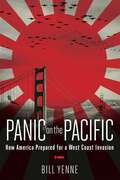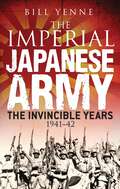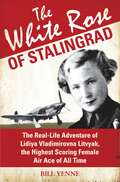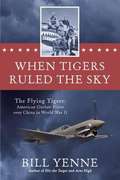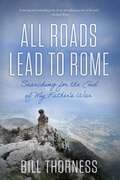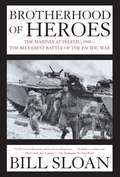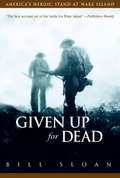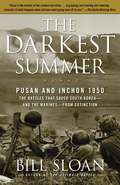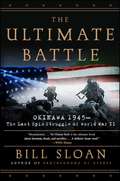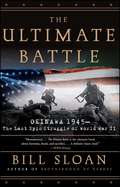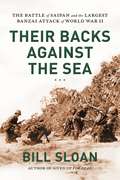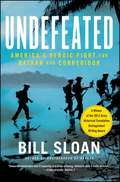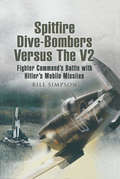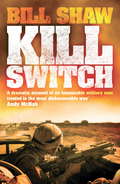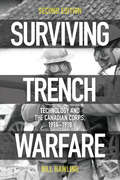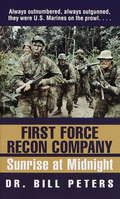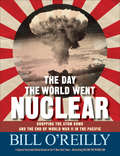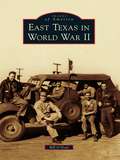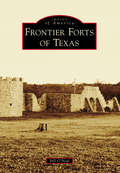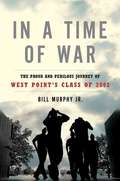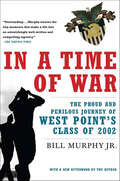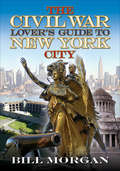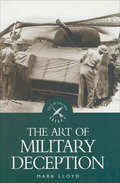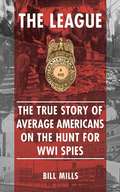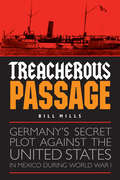- Table View
- List View
Panic on the Pacific: How America Prepared for the West Coast Invasion
by Bill YenneThe aftershocks of the December 7, 1941 attack on Pearl Harbor were felt keenly all over America-the war in Europe had hit home. But nowhere was American life more immediately disrupted than on the West Coast, where people lived in certain fear of more Japanese attacks. From that day until the end of the war, a dizzying mix of battle preparedness and rampant paranoia swept the states. Japanese immigrants were herded into internment camps. Factories were camouflaged to look like small towns. The Rose Bowl was moved to North Carolina. Airport runways were so well hidden even American pilots couldn't find them. There was panic on the Pacific coast: the Japanese were coming.
The Imperial Japanese Army
by Bill YenneThe German blitzkrieg stunned the world in 1939-1940, and so too did the Japanese "blitzkrieg" of 1941-1942 in the Philippines, Indonesia, Malaya, and Burma. However, the remarkable Japanese land offensive involving operations of equivalent scope and complexity has received only a fraction of the attention. This is the story of that campaign.One of the few histories that tells the story of the Pacific War from the Japanese side, this is the long-awaited overview of the years when the Imperial Japanese Army (IJA) was conducting its seemingly unstoppable ground campaign in the Far East. It includes extensive background and biographical information on Japanese commanders, including Homma and Yamashita. In just eight weeks following December 7, 1941, the IJA pushed the Americans out of the Philippines, and defeated the British to captured Manila, Hong Kong, the Malay Peninsula, and the great bastion at Singapore--called the "Gibraltar of the East." They also forced the capitulation and occupation of Siam and the occupation of Burma. A month later, the Japanese had added the Netherlands East Indies, with an area and depth of natural resources more than twice that of Japan, to their trophy case. In The Imperial Japanese Army, author Bill Yenne recounts how the IJA faced and surmounted technical challenges that the Wehrmacht did not have--transportation. Whereas most of the German conquests were reachable by highways or rail lines, all of the IJA operations required ship transport, and most required amphibious landings. For example, in the Malay Peninsula campaign, the IJA famously used bicycles for the drive on Singapore.Unlike most histories of the Pacific War that focus on the Allied experience, The Imperial Japanese Army examines the year of victory from the Japanese perspective, when the mighty Japanese naval and ground forces swept all before them both throughout the Pacific and on mainland Asia.
The White Rose of Stalingrad
by Bill YenneOf all the major air forces that were engaged in the war, only the Red Air Force had units comprised specifically of women. Initially the Red Air Force maintained an all-male policy among its combat pilots. However, as the apparently invincible German juggernaut sliced through Soviet defenses, the Red Air Force began to rethink its ban on women. By October 1941, authorization was forthcoming for three ground attack regiments of women pilots. Among these women, Lidiya Vladimirovna "Lilya" Litvyak soon emerged as a rising star. She shot down five German aircraft over the Stalingrad Front, and thus become history's first female ace. She scored 12 documented victories over German aircraft between September 1942 and July 1943. She also had many victories shared with other pilots, bringing her possible total to around 20. The fact that she was a 21-year-old woman ace was not lost on the hero-hungry Soviet media, and soon this colourful character, whom the Germans dubbed "The White Rose of Stalingrad," became both folk heroine and martyr.
When Tigers Ruled the Sky: American Outlaw Pilots over China in World War II
by Bill YenneFrom the acclaimed author of Hit the Target and Big Week, an in-depth account of the legendary World War II combat group, the Flying Tigers.In 1940, Pearl Harbor had not yet happened, and America was not yet at war with Japan. But China had been trying to stave off Japanese aggression for three years--and was desperate for aircraft and trained combat pilots.General Chiang Kai-shek sent military aviation advisor Claire Chennault to Washington, where President Roosevelt was sympathetic, but knew he could not intervene overtly. Instead, he quietly helped Chennault put together a group of American volunteer pilots.This was how the 1st American Volunteer Group--more commonly known as the Flying Tigers--was born.With the trademark smiling shark jaws on their P-40 fighters, these Army, Navy and Marine pilots became a sensation as they fought for the Chinese. Those who initially doubted them were eventually in awe as they persevered over Rangoon despite being outnumbered 14-1 by Japanese aircraft; as they were described by Madame Chiang Kai-shek as her "little angels" and by a Chinese foreign minister as "the soundest investment China ever made"; and as they ultimately destroyed hundreds of Japanese planes while losing only a dozen of their own in combat. Two of their veterans would later earn the Medal of Honor--and as a group, the Flying Tigers managed to rack up a better record than any other air wing in the Pacific theater. When Tigers Ruled the Sky is a thrilling and triumphant account of their courage and their legacy.
All Roads Lead to Rome: Searching for the End of My Father's War
by Bill ThornessWhat happens when a seasoned journalist and travel writer takes on his most challenging assignment yet—crossing not just continents but also history—by retracing his father&’s steps on the battlefields of Italy in World War II? When a slim packet of his father&’s letters came to light after his mother&’s death, Bill Thorness began a quest to rediscover his father. Thorness traveled to the World War II battlefields where America&’s first team of commandos fought. The youngest son of one of those commandos, Thorness gained a sense of the horror his father had kept from his family while standing on the mountain where the First Special Service Force fought. Then, standing on a bridge in Rome, he reflected on the loss his father must have felt in not making it to the end of the campaign to liberate the Eternal City. In All Roads Lead to Rome Thorness considers his father&’s decisive moments in battle and beyond, and how he soldiered on as a disabled veteran through his life, raising a family and succumbing to an early death. Alternating between reimagined battle scenes and present-day travels, Thorness explores World War II and family history, the value and limits of memory, the attitudes of war, and our society&’s inadequate understanding and support of combat veterans, who may return with physical and emotional scars that change them deeply. Thorness steps into his father&’s shoes to revisit his story and finish that walk into Rome, weaving an account that is part travelogue, part history, and part memoir about the ravages of war.
Brotherhood of Heroes
by Bill SloanA Band of Brothers for the Pacific, this is the gut-wrenching but ultimately triumphant story of the Marines' most ferocious -- yet largely forgotten -- battle of World War II. Between September 15 and October 15, 1944, the First Marine Division suffered more than 6,500 casualties fighting on a hellish little coral island in the Pacific. Peleliu was the scene of one of the most savage no-quarter struggles of modern times, one that has been all but forgotten -- until now. Drawing on extensive interviews with Marine veterans, Bill Sloan follows a small group of young Americans through this incredibly vicious campaign and rescues their heroism on Peleliu from obscurity. Misled by faulty intelligence, the 9,000 Marine infantrymen who landed on Peleliu's beaches under withering enemy fire found themselves facing 11,000 Japanese embedded in an intricate network of caves and underground fortifications unrivaled in the history of warfare. At the heart of the Japanese defensive system was a maze of sheer cliffs and deep ravines known collectively as the Umurbrogol plateau. Endless strings of ridges bristled with concealed artillery, mortars, machine guns, and riflemen, making every inch of contested ground a potential death trap for Marines. Making matters worse, Japanese soldiers had been told by their commanders that they were to hold Peleliu at any cost in a suicidal defense of the island. Sloan's gripping narrative seamlessly weaves together the experiences of the men who were there, producing a vivid and unflinching tableau of the twenty-four-hour-a-day nightmare of Peleliu -- a melee of nonstop infantry attacks, ferocious hand-to-hand fighting, night assaults, and exhausting forced marches in temperatures that topped 115 degrees. With casualties in some infantry units averaging more than sixty percent, Peleliu ranks with the bloodiest battles in the Corps' history. Exemplifying these staggering losses was K Company, Third Battalion, Fifth Marine Regiment (K/3/5), on whose gallant officers and enlisted men the narrative focuses from the initial assault on the beaches to the horrific struggle for the Umurbrogol's crags and crevices. Surprisingly, Peleliu received little public notice back in the States even as it was being fought and was virtually forgotten after the war, despite elements of controversy that are still debated by military strategists today. The invasion was ordered by Army General Douglas MacArthur to protect his flank as he launched his campaign to recapture the Philippines. But many experts believed then -- and still maintain today -- that the bloodshed at Peleliu was needless and that the island could have been safely bypassed. In Brotherhood of Heroes, readers witness the brutal spectacle of Peleliu close-up through the eyes of the Marines who fought there. Their story will stand with Ghost Soldiers and Flags of Our Fathers as a modern classic in military history and a riveting read.
Given Up for Dead: America's Heroic Stand at Wake Island
by Bill SloanA gripping narrative of unprecedented valor and personal courage, here is the story of the first American battle of World War II: the battle for Wake Island. Based on firsthand accounts from long-lost survivors who have emerged to tell about it, this stirring tale of the "Alamo of the Pacific" will reverberate for generations to come. On December 8, 1941, just five hours after the bombing of Pearl Harbor, Japanese planes attacked a remote U. S. outpost in the westernmost reaches of the Pacific. It was the beginning of an incredible sixteen-day fight for Wake Island, a tiny but strategically valuable dot in the ocean. Unprepared for the stunning assault, the small battalion was dangerously outnumbered and outgunned. But they compensated with a surplus of bravery and perseverance, waging an extraordinary battle against all odds. When it was over, a few hundred American Marines, sailors, and soldiers, along with a small army of heroic civilian laborers, had repulsed enemy forces several thousand strong--but it was still not enough. Among the Marines was twenty-year-old PFC Wiley Sloman. By Christmas Day, he lay semiconscious in the sand, struck by enemy fire. Another day would pass before he was found--stripped of his rifle and his uniform. Shocked to realize he hadn't awakened to victory, Sloman wondered: Had he been given up for dead--and had the Marines simply given up? In this riveting account, veteran journalist Bill Sloan re-creates this history-making battle, the crushing surrender, and the stories of the uncommonly gutsy men who fought it. From the civilians who served as gunmen, medics, and even preachers, to the daily grind of life on an isolated island--literally at the ends of the earth--to the agony of POW camps, here we meet our heroes and confront the enemy face-to-face, bayonet to bayonet.
The Darkest Summer: Pusan and Inchon 1950: The Battles That Saved South Korea--and the Marines--from Extinction
by Bill SloanThe acclaimed, dramatic story of the first three months of the Korean War, when outnumbered and outgunned Marines and GIs executed two of the greatest military operations in history and saved South Korea—and the Marine Corps—from extinction.The Darkest Summer is the dramatic story of the first three months of the Korean War as it has never been told before. A narrative studded with gripping eyewitness accounts, it focuses on the fateful days when the Korean War&’s most decisive battles were fought and the Americans who fought them went—however briefly—from the depths of despair to the exultation of total conquest. Drawing on exclusive interviews with dozens of surviving U.S. veterans, it reveals how one ninety-day period changed the course of modern history and opens a unique and revealing window on an all-but-forgotten war.
The Ultimate Battle
by Bill SloanThe Ultimate Battle is the full story of the last great clash of World War II as it has never before been told. With the same "grunt's-eye-view" narrative style that distinguished his Brotherhood of Heroes (on the Battle of Peleliu), Bill Sloan presents a gripping and uniquely personal saga of heroism and sacrifice in which at least 115,000 soldiers, sailors, and airmen from both sides were killed, as were nearly 150,000 civilians caught in the crossfire or encouraged to commit suicide by Japanese troops. It is a story set against a panorama of more than 1,500 American ships, nearly two thousand Japanese kamikazes sworn to sink those ships, and two huge armies locked in a no-quarter struggle to the death -- the 541,000 GIs and Marines of the U.S. Tenth Army, and Japan's 110,000-man 32nd Army. Woven into the broader narrative, in Band of Brothers style, are the personal stories of men who endured this epic battle and were interviewed by the author. In many cases, their experiences are told here in print for the first time. A few days after Japanese defenders surprised American assault troops by allowing them to land virtually unopposed on April 1, 1945, scouts of the 96th Division stumbled onto the outerworks of formidable Japanese defenses near Kakazu Ridge, where fierce fighting erupted. It would continue without respite for nearly three months as American forces used every weapon and strategy at their disposal to break through three cunningly designed Japanese lines of defense, each anchored by commanding high ground, intricate underground installations, and massed artillery. When one line was about to be breached, the Japanese would slip away to the next one, forcing the Americans to repeat the same exhausting and deadly "corkscrew and blowtorch" assaults all over again. Much of the action in The Ultimate Battle unfolds among men pinned down under relentless fire on disputed hillsides, in the ruins of shell-blasted villages, and inside stricken tanks and armored cars. Sloan also takes readers aboard flaming ships and into the cockpits of night-fighter aircraft to capture the horror and heroism of men and vessels besieged by kamikazes. When the battle was over, most of the GIs, Marines, and sailors who survived it were too worn out to celebrate. More than 49,000 of their comrades had been killed or wounded, and they knew that the even more brutal invasion of Japan's home islands loomed just ahead. But as Sloan makes clear, the slaughter at Okinawa helped to convince President Truman to use the atomic bomb against Japanese cities in the hope of shortening the war and averting a far more horrific loss of life. The Ultimate Battle is a searing and unforgettable recreation of the Okinawa campaign as it was experienced by men who were there. It is filled with fresh insights that only those men can provide.
The Ultimate Battle, Okinawa 1945: The Last Epic Struggle of World War II
by Bill SloanThe Ultimate Battle is the full story of the last great clash of World War II as it has never before been told. With the same "grunt's-eye-view" narrative style that distinguished his Brotherhood of Heroes (on the Battle of Peleliu), Bill Sloan presents a gripping and uniquely personal saga of heroism and sacrifice in which at least 115,000 soldiers, sailors, and airmen from both sides were killed, as were nearly 150,000 civilians caught in the crossfire or encouraged to commit suicide by Japanese troops. It is a story set against a panorama of more than 1,500 American ships, nearly two thousand Japanese kamikazes sworn to sink those ships, and two huge armies locked in a no-quarter struggle to the death -- the 541,000 GIs and Marines of the U. S. Tenth Army, and Japan's 110,000-man 32nd Army. Woven into the broader narrative, in Band of Brothers style, are the personal stories of men who endured this epic battle and were interviewed by the author. In many cases, their experiences are told here in print for the first time. A few days after Japanese defenders surprised American assault troops by allowing them to land virtually unopposed on April 1, 1945, scouts of the 96th Division stumbled onto the outerworks of formidable Japanese defenses near Kakazu Ridge, where fierce fighting erupted. It would continue without respite for nearly three months as American forces used every weapon and strategy at their disposal to break through three cunningly designed Japanese lines of defense, each anchored by commanding high ground, intricate underground installations, and massed artillery. When one line was about to be breached, the Japanese would slip away to the next one, forcing the Americans to repeat the same exhausting and deadly "corkscrew and blowtorch" assaults all over again. Much of the action in The Ultimate Battle unfolds among men pinned down under relentless fire on disputed hillsides, in the ruins of shell-blasted villages, and inside stricken tanks and armored cars. Sloan also takes readers aboard flaming ships and into the cockpits of night-fighter aircraft to capture the horror and heroism of men and vessels besieged by kamikazes. When the battle was over, most of the GIs, Marines, and sailors who survived it were too worn out to celebrate. More than 49,000 of their comrades had been killed or wounded, and they knew that the even more brutal invasion of Japan's home islands loomed just ahead. But as Sloan makes clear, the slaughter at Okinawa helped to convince President Truman to use the atomic bomb against Japanese cities in the hope of shortening the war and averting a far more horrific loss of life. The Ultimate Battle is a searing and unforgettable recreation of the Okinawa campaign as it was experienced by men who were there. It is filled with fresh insights that only those men can provide.
Their Backs against the Sea: The Battle of Saipan and the Largest Banzai Attack of World War II
by Bill SloanIn the midst of the largest banzai attack of the war, US Army Lt. Col. William O'Brien, grievously wounded and out of ammunition, grabbed a sabre from a fallen Japanese soldier and flailed away at a small army of assailants, screaming to his men, "Don't give them a damn inch!" When his body was recovered the next day, thirty dead enemies were piled around him.The Battle of Saipan lasted twenty-five hellish days in the summer of 1944, and the stakes couldn't have been higher. If Japan lost possession of the island, all hope for victory would be lost. For the Americans, its capture would result in secure air bases for the new B-29s that would put them within striking distance of the Japanese homeland. The outcome of the war in the Pacific lay in the balance.In this gritty, vivid narrative, award-winning author Bill Sloan fuses fresh interviews, oral and unit histories, and unpublished accounts to describe one of the war's bloodiest and most overlooked battles of the Pacific theater. Combining grunt's-view grit with big picture panorama (and one of the ugliest inter-service controversies of the war), Their Backs against the Sea is the definitive dramatic story of this epic battle--and an inspiring chronicle of some of the greatest acts of valor in American military history.
Undefeated
by Bill SloanBased on exclusive interviews with more than thirty survivors, Undefeated tells the courageous story of the outnumbered American soldiers and airmen who stood against invading Japanese forces in the Philippines at the beginning of World War II, and continued to resist through three harrowing years as POWs. Bill Sloan, "a master of the combat narrative" (Dallas Morning News), captures the valor, fortitude, and agony of the American defenders of the Philippines. Abandoned by their government, the men and women of the U.S. garrison battled hopeless military odds, rampant disease, and slow starvation to delay the inevitable surrender of the largest American military force ever. For four months they fought toe to toe against overwhelming enemy numbers--and forced the Japanese to pay a heavy cost in blood for every inch of ground they gained on the Bataan peninsula. After the surrender came the infamous Bataan Death March, where up to eighteen thousand American and Filipino prisoners died or were murdered as they marched sixty-five miles under the most hellish conditions imaginable. Rather than picturing these defenders as little more than helpless victims of a powerful and sadistic enemy--as have most previous books about the Philippine campaign--Undefeated tells the full story of the remarkable courage and indomitable will that cost the Japanese invaders thousands of casualties on Bataan and Corregidor. Interwoven throughout this gripping narrative are the harrowing personal experiences of dozens of American soldiers, airmen, and Marines. Sloan also provides vivid portraits of the officers who led the American forces, such as General Douglas MacArthur, who escaped to Australia as the situation on Bataan worsened, and General Jonathan Wainwright, who succeeded him as top U.S. commander in the Philippines and himself became a prisoner of the Japanese. Undefeated chronicles one of the great sagas of World War II--and celebrates a resounding triumph of the human spirit.
Spitfire Dive-Bombers Versus the V2: Fighter Command's Battle with Hitler's Mobile Missiles
by Bill SimpsonOn 8 September 1944 the first of over 1,000 V2 missiles aimed at southern England exploded in west London. It had been launched from a wooded street corner in Den Haag in the Netherlands. Fighter Command was responsible for defending Britain from air attack and thus Air Marshal Roderic Hill countered the threat by using six squadrons of Spitfires from 12 Group bases in Norfolk to discover and then dive-bomb the mobile V2 launch sites scattered throughout the Dutch towns and countryside. This was no easy task as the missiles were well camouflaged and often positioned adjacent to dwellings occupied by civilians. The RAF was under orders to cause minimum damage to Dutch property and life, therefore precision bombing became a necessity. This is a full account of the campaign including discussions of the strategy and tactics employed and the equipment used and it also considers the effect upon Dutch civilians. It draws upon the experiences of sixteen Allied pilots, ground crew and the Dutch who were at the receiving-end of the attacks.
Kill Switch
by Bill ShawFrom surviving a horrific terrorist attack in Northern Ireland, to the violence of the Gulf War and an assault course of harrowing experiences in Iraq, Bosnia and Columbia, Major Bill Shaw had seen it all. But Bill's strength and courage was tested to its absolute limits when he was arrested for a crime he did not commit. Posted in Afghanistan after two years in Iraq, Bill was responsible for the safety of four hundred men in a full-scale danger zone in one of the most dangerous countries in the world. The married father and grandfather, who had risen through the ranks to become a commander of men and an MBE, had long accepted that each day could be his last. But he never expected to find his own life at risk under a corrupt legal system. Thrown into prison and forced to share a cramped, vermin-infested cell with sixteen Afghans, among them members of the Taliban and al-Qaeda, Bill had no idea when, or even if, he would see his family again. This is the incredible true story of a brave soldier who survived some of the toughest war zones in the world only to face the nightmare of being wrongfully imprisoned a very long way from home. Gritty and gripping, this powerful military memoir is an eye-opening account of life on the frontline.
Surviving Trench Warfare
by Bill RawlingThe horrors of the First World War were the product of a new and unprecedented type of industrial warfare. To survive and win demanded not just new technology but the techniques to use it effectively. In Surviving Trench Warfare, Bill Rawling takes a close look at how technology and tactics came together in the Canadian Corps.Drawing on a wide range of sources, from interviews to staff reports, Rawling describes the range of new weapons that the Canadians adopted, including tanks, trench mortars, and poison gas, making it clear that the decisive factor in the war was not the new technology itself but how the Canadians responded to it. Only through intensive training, specialization, and close coordination between infantry and artillery could the Canadians overcome the deadly trinity of machine-guns, barbed wire, and artillery. Surviving Trench Warfare offers a whole new understanding of the First World War, replacing the image of a static trench war with one in which soldiers actively struggled for control over their weapons and their environment, and achieved it.Released to coincide with the centenary of the First World War, this edition includes a new introduction and afterword reflecting the latest scholarship on the conduct of the war.
First Force Recon Company
by Bill PetersIn 1st Force Recon you performed at a very high level of proficiency. Or you died. . . .In 1969, First Lieutenant Bill Peters and the Force Recon Marines had one of the most difficult, dangerous assignments in Vietnam. From the DMZ to the Central Highlands, their job was to provide strategic and operational intelligence to insure the security of American units as the withdrawal of the troops progressed.Making perilous helicopter inserts deep in the Que Son Mountains, where the constant chatter of AK-47 rifle fire left no doubt who was in charge, Peters and the other men of 1st Force Recon Company risked their lives every day in six-man teams, never knowing whether they would live to see the sunset. Peters's accounts of silently watching huge movements of heavily armed NVA regulars, prisoner snatches, sudden-death ambushes, and extracts from fiercely fought firefights vividly capture the realities of Recon Marine warfare, and offer a gritty tribute to the courage, heroism, and sacrifice of the U. S. Marines. . . .From the Paperback edition.
The Day the World Went Nuclear: Dropping the Atom Bomb and the End of World War II in the Pacific
by Bill O'ReillyAutumn 1944. World War II is nearly over in Europe, but in the Pacific, American soldiers face an enemy who will not surrender, despite a massive and mounting death toll. Meanwhile, in Los Alamos, New Mexico, Dr. J. Robert Oppenheimer and his team of scientists are preparing to test the deadliest weapon known to mankind. Newly inaugurated president Harry Truman faces the most important political decision in history: whether to use that weapon. Adapted from Bill O'Reilly's historical thriller Killing the Rising Sun, with characteristically gripping storytelling, this story explores the decision to use the atom bomb and the end of World War II in the Pacific.
East Texas in World War II (Images of America)
by Bill O'NealTexas made a remarkable contribution to the American war effort during World War II . Almost 830,000 Texans, including 12,000 women, donned uniforms, and more than 23,000 Texas fighting men died for their country. America's most decorated soldier, Lt. Audie Murphy, and most decorated sailor, submarine commander Sam Dealey, both were Texans. Texas A&M, an all-male military college, placed 20,000 men in the armed forces, of which 14,000 were officers--more than any other school in the nation, including the U.S. Military Academy at West Point. Gen. Dwight D. Eisenhower, the supreme commander of Allied Forces in Europe, was born in Denison in northeast Texas. Adm. Chester Nimitz, commander in chief of the Pacific Fleet, was born and raised in Texas. Almost 1.5 million soldiers, sailors, and fliers trained at scores of Texas bases. Texas oil fueled the Allied war effort, while Texas shipyards and defense plants provided a flood of war machines and munitions during the war effort.
Frontier Forts of Texas (Images of America)
by Bill O'NealWith its vast size and long frontier period, Texas was the scene of more combat events between Native American warriors and Anglo soldiers and settlers than any other state or territory. The US Army, therefore, erected more military outposts in Texas, a tradition begun by Spanish soldados and their presidios. Settlers built blockhouses and even stockades, the most famous of which was Parker's Fort, the site of an infamous massacre in 1836. Successive north to south lines of Army forts attempted to screen westward-moving settlers from war parties, while border posts stretched along the Rio Grande from Fort Brown on the Gulf of Mexico to Fort Bliss at El Paso del Norte. Texas was the site of the first US Cavalry regiment employed against horseback warriors, as well as the experimental US Camel Corps. From Robert E. Lee to Albert Sidney Johnston to Ranald Mackenzie, the Army's finest officers served out of Texas forts, and 61 Medals of Honor were earned by soldiers campaigning in the Lone Star State.
In a Time of War: The Proud and Perilous Journey of West Point's Class of 2002
by Bill Murphy Jr.The dramatic story of West Point's class of 2002, the first in a generation to graduate during wartime. They came to West Point in a time of peace, but soon after the start of their senior year, their lives were transformed by September 11. The following June, when President George W. Bush spoke at their commencement and declared that America would 'take the battle to the enemy,' the men and women in the class of 2002 understood that they would be fighting on the front lines. In this stirring account of the five years following their graduation from West Point, the class experiences firsthand both the rewards and the costs of leading soldiers in the war on terror. In a Time of War focuses on two members of the class of 2002 in particular: Todd Bryant, an amiable, funny Californian for whom military service was a family tradition; and Drew Sloan, the hardworking son of liberal parents from Arkansas who is determined to serve his country. On the battlefields of Iraq and Afghanistan, Todd, Drew, and their classmates--the army's newest and youngest officers--lead their troops into harm's way again and again. Meticulously reported, sweeping in scope, Bill Murphy Jr.'s powerful book follows these brave and idealistic officers--and their families--as they experience the harrowing reality of the modern battlefield. In a Time of War tells a vivid and sometimes heartbreaking story about courage, honor, and what war really means to the soldiers whose lives it defines.
In a Time of War: The Proud and Perilous Journey of West Point's Class of 2002
by Bill Murphy Jr.The dramatic story of West Point's class of 2002, the first in a generation to graduate during wartimeThey came to West Point in a time of peace, but soon after the start of their senior year, their lives were transformed by September 11. The following June, when President George W. Bush spoke at their commencement and declared that America would "take the battle to the enemy," the men and women in the class of 2002 understood that they would be fighting on the front lines. In this stirring account of the five years following their graduation from West Point, the class experiences firsthand both the rewards and the costs of leading soldiers in the war on terror. In a Time of War focuses on two members of the class of 2002 in particular: Todd Bryant, an amiable, funny Californian for whom military service was a family tradition; and Drew Sloan, the hardworking son of liberal parents from Arkansas who is determined to serve his country. On the battlefields of Iraq and Afghanistan, Todd, Drew, and their classmates—the army's newest and youngest officers—lead their troops into harm's way again and again. Meticulously reported, sweeping in scope, Bill Murphy Jr.'s powerful book follows these brave and idealistic officers—and their families—as they experience the harrowing reality of the modern battlefield. In a Time of War tells a vivid and sometimes heartbreaking story about courage, honor, and what war really means to the soldiers whose lives it defines.
The Civil War Lover's Guide to New York City
by Bill MorganThis fascinating illustrated guide is “a must for any Civil War buff visiting or living in New York City” (New York Journal of Books). Few Americans associate New York City with the Civil War, but the most populated metropolitan area in the nation, then and now, is filled with scores of monuments, historical sites, and resources directly related to those four turbulent years. Veteran author Bill Morgan’s The Civil War Lover’s Guide to New York City examines more than 150 of these largely overlooked and often forgotten historical gems. Morgan’s book takes readers on a journey of historical discovery. Walk inside the church where Stonewall Jackson was baptized, visit the building where Lincoln delivered his famous Cooper Union Speech, and marvel that the church built by the great abolitionist Henry Ward Beecher is still used for worship. A dozen Civil War–era forts still stand (the star-shaped bastion upon which the Statue of Liberty rests was a giant supply depot), and one of them sent relief supplies to besieged Fort Sumter in Charleston. Visit the theater where “Dixie” was first performed and the house where Stephen Crane wrote The Red Badge of Courage. After the war, New York honored the brave men who fought by erecting some of the nation’s most beautiful memorials in honor of William T. Sherman, Admiral David Farragut, and Abraham Lincoln. These and many others still grace parks and plazas around the city. Ulysses S. Grant adopted New York as his home and is buried here in the largest mausoleum in America (which was also the most-visited monument in the country). See the homes where many generals, including Winfield Scott, George B. McClellan, and even Robert E. Lee, once lived. Complete with full-color photos and maps, Morgan’s lavishly illustrated and designed volume is a must-have book for every student of the Civil War and for every visitor to New York City.
Epehy: Hindenburg Line (Battleground Ser.)
by Bill MitchinsonThe village of Epehy gave its name to one of the most important battles of 1918.Evacuated by the Germans during their retreat to the Hindenburg Line, the ruins were occupied by British Forces until the German offensive. They were recaptured in some of the bloodiest engagements of September 1918.
The League: The True Story of Average Americans on the Hunt for WWI Spies
by Bill MillsTwo weeks before the U.S. entered World War I, a Chicago advertising executive visited the Department of Justice with a proposal - organize the country’s businessmen into a secret force of volunteer agents to ferret out and investigate enemy activities within the United States. The country, overcome by a wave of patriotic fervor, had also become gripped with fear and uncertainty of the influx of immigrants from the very countries with which the country was now at war.The idea received quick approval and caught on like wildfire. Soon thousands of volunteers in every major industry, trade and profession were on the alert nationwide, maintaining surveillance and investigating cases for the Department of Justice Bureau of Investigation. They would grow to become 250,000 strong.Written as a real-life adventure story, The League reveals how the organization began, the manner in which it operated, and the varied missions that it performed on behalf of the U.S. government. It is an extraordinary chapter in American history, when almost any citizen could receive official credentials as a volunteer investigator. From a running gun battle on the streets of Philadelphia, to the seizure of a disguised German commerce raider on the high seas, to the hunt for the radical bomber that attacked the Federal Building in Chicago, The League is a fascinating true story that will not soon be forgotten.
Treacherous Passage: Germany's Secret Plot against the United States in Mexico during World War I
by Bill MillsWhile the Great War raged across the trench-lined battlefields of Europe, a hidden conflict took place in the distant hinterlands of the turbulent Mexican Republic. German officials and secret-service operatives plotted to bring war to the United States through an array of schemes and strategies, from training a German-Mexican army for a cross-border invasion, to dispatching saboteurs to disrupt American industry, and planning for submarine bases on the western coast of Mexico. Bill Mills tells the true story of the most audacious of these operations: the German plot to launch clandestine sea raiders from the Mexican port of Mazatlán to disrupt Allied merchant shipping in the Pacific. The scheme led to a desperate struggle between German and American secret agents in Mexico. German consul Fritz Unger, the director of a powerful trading house, plotted to obtain a salvaged Mexican gunboat to supply U-boats operating off Mexico and to seize a hapless tramp schooner to help hunt Allied merchantmen. Unger’s efforts were opposed by a colorful array of individuals, including a trusted member of the German secret service in Mexico who was also the top American spy, the U.S. State Department’s senior officer in Mazatlán, the hard-charging commander of a navy gunboat, and a draft-dodging American informant in the enemy camp. Full of drama and intrigue, Treacherous Passage is the first complete account of the daring German attempts to raid Allied shipping from Mexico in 1918.
